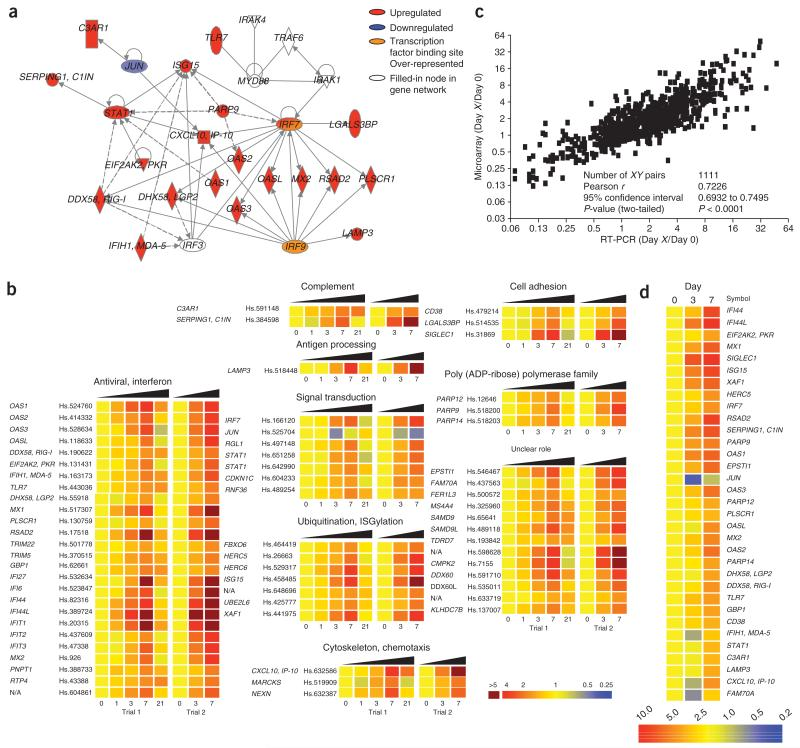Systems biology approach predicts immunogenicity of the yellow fever vaccine in humans.
A major challenge in vaccinology is to prospectively determine vaccine efficacy. Here we have used a systems biology approach to identify early gene 'signatures' that predicted immune responses in humans vaccinated with yellow fever vaccine YF-17D. Vaccination induced genes that regulate virus innate sensing and type I interferon production. Computational analyses identified a gene signature, including complement protein C1qB and eukaryotic translation initiation factor 2 alpha kinase 4-an orchestrator of the integrated stress response-that correlated with and predicted YF-17D CD8(+) T cell responses with up to 90% accuracy in an independent, blinded trial. A distinct signature, including B cell growth factor TNFRS17, predicted the neutralizing antibody response with up to 100% accuracy. These data highlight the utility of systems biology approaches in predicting vaccine efficacy.
Authors
Troy D Querec; Rama S Akondy; Eva K Lee; Weiping Cao; Helder I Nakaya; Dirk Teuwen; Ali Pirani; Kim Gernert; Jiusheng Deng; Bruz Marzolf; Kathleen Kennedy; Haiyan Wu; Soumaya Bennouna; Herold Oluoch; Joseph Miller; Ricardo Z Vencio; Mark Mulligan; Alan Aderem; Rafi Ahmed; Bali Pulendran
External link
Publication Year
Publication Journal
Associeted Project
Systems Vaccinology
Lista de serviços
-
As antisense RNA gets intronic.As antisense RNA gets intronic.
-
Androgen responsive intronic non-coding RNAs.Androgen responsive intronic non-coding RNAs.
-
Conserved tissue expression signatures of intronic noncoding RNAs transcribed from human and mouse loci.Conserved tissue expression signatures of intronic noncoding RNAs transcribed from human and mouse loci.
-
The intronic long noncoding RNA ANRASSF1 recruits PRC2 to the RASSF1A promoter, reducing the expression of RASSF1A and increasing cell proliferation.The intronic long noncoding RNA ANRASSF1 recruits PRC2 to the RASSF1A promoter, reducing the expression of RASSF1A and increasing cell proliferation.
-
Antisense intronic non-coding RNA levels correlate to the degree of tumor differentiation in prostate cancer.Antisense intronic non-coding RNA levels correlate to the degree of tumor differentiation in prostate cancer.
-
Insight Into the Long Noncoding RNA and mRNA Coexpression Profile in the Human Blood Transcriptome Upon Leishmania infantum Infection.Insight Into the Long Noncoding RNA and mRNA Coexpression Profile in the Human Blood Transcriptome Upon Leishmania infantum Infection.
-
Long non-coding RNAs associated with infection and vaccine-induced immunityLong non-coding RNAs associated with infection and vaccine-induced immunity
-
Comparative transcriptomic analysis of long noncoding RNAs in Leishmania-infected human macrophagesComparative transcriptomic analysis of long noncoding RNAs in Leishmania-infected human macrophages
-
SARS-CoV-2 Selectively Induces the Expression of Unproductive Splicing Isoforms of Interferon, Class I MHC, and Splicing Machinery Genes.SARS-CoV-2 Selectively Induces the Expression of Unproductive Splicing Isoforms of Interferon, Class I MHC, and Splicing Machinery Genes.

